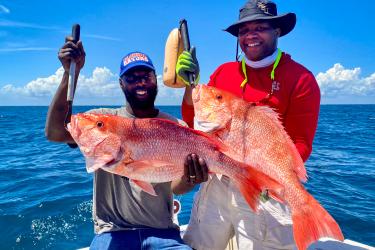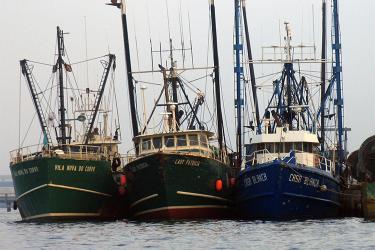NOAA Fisheries Office of Law Enforcement led an investigation resulting in the conviction and sentencing of Zachary Brandon Barfield for violations of the Marine Mammal Protection Act. On May 21, 2025, Federal Magistrate Judge Michael J. Frank of the Northern District of Florida, Panama City Division, sentenced Barfield to 30 days incarceration on each count, all served concurrently followed by 1 year of supervised release on each count, concurrently and a $51,000 fine. He was convicted of poisoning dolphins with an unlawfully used pesticide and killing dolphins with a firearm. The U.S. Department of Justice’s Environmental Crimes Section and the U.S. Attorney’s Office for the Northern District of Florida successfully prosecuted the case.
In 2023, a NOAA Fisheries special agent received a tip that a fisherman was killing bottlenose dolphins. This led to a 2-year investigation in coordination with the Florida Fish and Wildlife Conservation Commission, and ultimately a criminal prosecution by the Department of Justice. NOAA Fisheries obtained key prosecution evidence, including a shotgun and one container of methomyl, a restricted-use pesticide that has no residential use and is highly toxic.
In 2022 and 2023 Barfield repeatedly shot dolphins and fed them poison-wrapped baitfish from his fishing vessel and an additional charter vessel, both based out of Panama City, Florida. This activity occurred on a combination of commercial and charter trips. Our investigation revealed that Barfield shot at least five dolphins with a 12-gauge shotgun, with one confirmed death. One of the shootings occurred on a charter vessel with multiple witnesses on board.
Based on evidence obtained in the course of the investigation, Barfield fed an estimated 24–70 dolphins poison-laden baitfish on charter trips that he captained. Barfield stated he was “frustrated with dolphins ‘stealing’ his catch.” Over the course of an estimated six to seven charter trips during the summer of 2022, Barfield deliberately used methomyl to poison dolphins. His use of the methomyl was deliberate, resulted in harmful impacts to the local population of bottlenose dolphins, and likely resulted in multiple dolphin deaths.
The conflict between anglers and dolphins has been widely documented throughout the Southeast. From 2014 to 2024, there were 21 known intentional dolphin fatalities from gunshot wounds, arrows, explosives and other sharp objects. Research cited during the trial indicates that gunshot wounds to marine mammals are severely underestimated.
Violations of the Marine Mammal Protection Act fall under jurisdiction of NOAA Fisheries Office of Law Enforcement, which expeditiously investigates all alleged violations. “There are consequences to individuals who decide to harm protected and endangered species,” said Paige Casey, acting assistant director, NOAA Fisheries Office of Law Enforcement Southeast Division. “We take these types of actions seriously and we will exhaust any and all leads related to marine mammal deaths to prosecute bad actors to the full extent of the law. The illegal use of a pesticide is alarming and we encourage anyone who may witness harmful behavior to marine mammals, and any other actions detrimental to marine life, to contact our enforcement hotline.”
Identifying and halting illegal marine mammal harassment and deaths is a priority for NOAA Fisheries. Investigations into violent acts against wildlife are difficult to investigate. This successful prosecution is a credit to the investigators and the close working relationship between NOAA Fisheries and the Florida Fish and Wildlife Conservation Commission, and prosecuting partners at:
- Department of Justice Environmental Crimes Section
- U.S. Attorney’s Office for the Northern District of Florida
Harassing, harming, killing, or feeding wild dolphins is prohibited under the Marine Mammal Protection Act. Violations can be prosecuted civilly or criminally and are punishable by up to $100,000 in fines and up to 1 year in jail per violation. Report any stranded or injured marine animals to the Southeast Marine Mammal Stranding Hotline at (877) WHALE-HELP (877-942-5243). When encountering bottlenose dolphins, or any marine mammals, there are viewing guidelines as well as best practices to follow in order to avoid conflict.
We encourage anyone with knowledge of persons causing marine mammals harm to call the NOAA Enforcement Hotline at (800) 853-1964.




